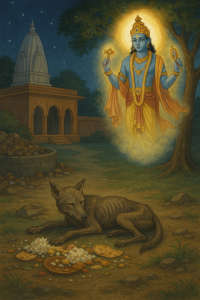A Temple Alive with Devotion
In a small village surrounded by flowering fields, stood a charming temple dedicated to Lord Hari. Every morning, the priests and villagers would gather to chant bhajanas, recite sacred verses, and offer tulasī, incense, and ghee lamps. The atmosphere was permeated with sacred sound vibration, and the walls of the temple echoed with the holy names of the Lord.
Children would clap their hands in kīrtana, the elderly would sit in peaceful remembrance, and even the animals that lingered nearby were drawn to the sound of devotion.
The Crow’s Daily Visit
Among these was a black crow, known to perch on the branches of a nearby neem tree. Attracted by the melodies and the prasāda occasionally thrown by the villagers, the crow would caw loudly, flapping its wings and calling out rhythmically during the daily kīrtana.
Though it did not understand the sacred names, it responded joyfully to the sound. Each morning, the crow would fly to the temple tree, join in with its calls, and flap its wings vigorously—involuntarily participating in the worship of the Lord.
The Crow’s Last Song
One day, after a particularly loud morning session of nāma-saṅkīrtana, the crow let out a sharp series of caws, fluttered its wings, and then fell lifeless from the tree.
At that very instant, the skies opened, and Viṣṇudūtas arrived, their expressions filled with gentle joy. They declared to the astonished villagers:
“This crow, though born in a lowly form, has been chanting in the atmosphere of Hari’s glorification every day. His caws became intertwined with the sound of the holy name, and he has thus performed unconscious kīrtana. For this, he is now granted freedom from the cycle of birth and death, and will reside eternally in Vaikuṇṭha.”
The soul of the crow emerged, radiant and bright, and was lifted into the divine sky.
Lessons to Be Learned:
- Even accidental or unconscious chanting, when done near devotional sound, has the power to purify and liberate.
- All beings benefit from nāma-saṅkīrtana, regardless of their species or level of awareness.
- The holy name is supremely powerful and acts independently of one’s qualification.
- As confirmed in the scriptures: “kīrtanād eva kṛṣṇasya mukta-saṅgaḥ paraṁ vrajet”
“Simply by chanting the name of Kṛṣṇa, one is freed from all bondage and attains the supreme goal.” (Bhāg. 12.3.51)
Origin of the Story: Padma Purāṇa – Stories section glorifying the power of nāma-saṅkīrtana and how even a crow attained liberation by being near the chanting of the Lord’s names.
